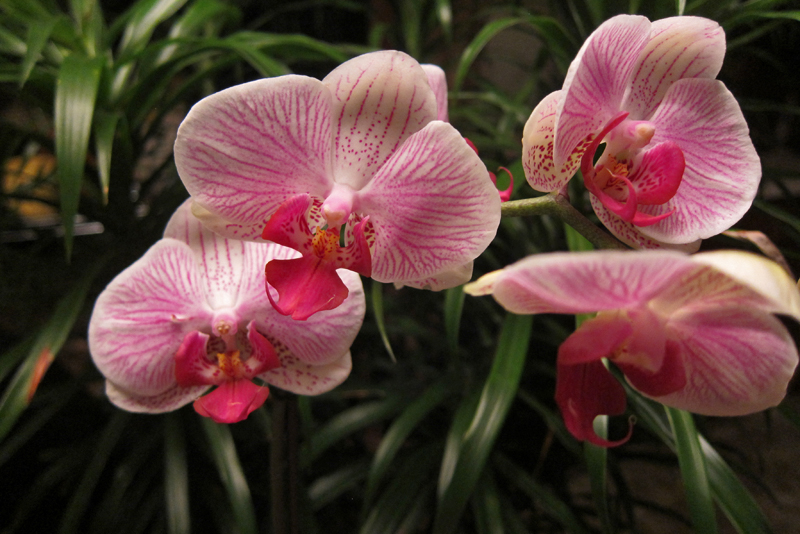Growth requirements of the Terrestrial Orchids

Mostly erect plants, the terrestrial orchids are hardier plants than the epiphytic orchids and should be tried first by the beginners. Though, terrestrial are less popular than the epiphytic orchids, they have equally beautiful flowers. Terrestrials can be found growing in abundance in tropics as well as temperate regions, unlike the epiphytes which prefer the tropics more. These are even found growing above the Arctic Circle according to the Wikipedia.
Terrestrials can be classified into two broad groups according to their growth habits: lithophytes or soil growing autotrophs and the saprophytes. Lithophytic orchids grow on rocky terrain; these orchids are also seen growing without any problem in the soil. These are sometimes seen growing as epiphytes also. The saprophytic orchids are much less popular as houseplants than any other orchid type. These can't produce their own food, as in nature saprophytes depend upon dead and decaying organic matter such as fallen dead leaves. Saprophytes are so called hidden plants, as they do not possess leafy shoots, but send out shoots which just bear the flowers in the growing season.
If the orchid that you have obtained is a terrestrial, then it most probably belongs to the earlier group. These orchids however, do not have adaptations like that off epiphytes. Water is easily or rather abundantly available on the forest floor (especially in the tropics), so are the nutrients. What is deficient is the sunlight. The canopy of the trees prevents much of the sunrays from reaching the ground. The air movement too is not much at the level of the terrestrial plants. So while growing terrestrial orchid keep this in mind.
I will list the requirements of terrestrial orchids here. These require more water as compared to the epiphytes, but it's important to have a good drainage. Stagnant water near the roots might lead to rotting or even fungal growth. So the watering frequency should be higher, but no stagnation. Humidity should also be maintained a higher levels especially if the plant is from the tropics. In summers, I water my terrestrials once in the evening and in winters once in a week (that is, when summer temperatures are around 30 - 40°C and humidity around 80% and winter temperatures around 10 - 20°C and humidity around 30%).
Growth medium for terrestrials can be anything from soil, pebbles of different sizes, activated charcoal, bark pieces. The growth medium should hold the plant as well as be able to maintain sufficient moisture levels, so that the roots don't dry off.
Light requirements of terrestrial orchids are easily fulfilled by early morning sun. Too strong or harsh sunlight can burn their leaves. There are some orchids though, which grow in open meadows or in areas where tree canopy is missing, such species can tolerate bright sun. Even if you have a sun loving orchid, avoid evening sun. I would rather keep the evening sun away from all my orchids!
Terrestrials are mainly propagated through backbulbs/rhizomes. You can leave these in the orchid pot itself but cover it with the soil, which should not be allowed to dry out completely.
I don't fertilize my terrestrial frequently, when I do it is with a very weak solution or may be by dropping 2-3 grains of urea around the root region.
Saprophytic orchids are rarely grown. They have a rhizome like structure lying underground, leaves are absent as these do not produce their own food. They are adapted to digest decaying organic matter.
I hope this helps in supplementing your knowledge on terrestrials. For any query you are free to ask me in the Orchid Forum, I would be glad to help you.
Terrestrials can be classified into two broad groups according to their growth habits: lithophytes or soil growing autotrophs and the saprophytes. Lithophytic orchids grow on rocky terrain; these orchids are also seen growing without any problem in the soil. These are sometimes seen growing as epiphytes also. The saprophytic orchids are much less popular as houseplants than any other orchid type. These can't produce their own food, as in nature saprophytes depend upon dead and decaying organic matter such as fallen dead leaves. Saprophytes are so called hidden plants, as they do not possess leafy shoots, but send out shoots which just bear the flowers in the growing season.
If the orchid that you have obtained is a terrestrial, then it most probably belongs to the earlier group. These orchids however, do not have adaptations like that off epiphytes. Water is easily or rather abundantly available on the forest floor (especially in the tropics), so are the nutrients. What is deficient is the sunlight. The canopy of the trees prevents much of the sunrays from reaching the ground. The air movement too is not much at the level of the terrestrial plants. So while growing terrestrial orchid keep this in mind.
I will list the requirements of terrestrial orchids here. These require more water as compared to the epiphytes, but it's important to have a good drainage. Stagnant water near the roots might lead to rotting or even fungal growth. So the watering frequency should be higher, but no stagnation. Humidity should also be maintained a higher levels especially if the plant is from the tropics. In summers, I water my terrestrials once in the evening and in winters once in a week (that is, when summer temperatures are around 30 - 40°C and humidity around 80% and winter temperatures around 10 - 20°C and humidity around 30%).
Growth medium for terrestrials can be anything from soil, pebbles of different sizes, activated charcoal, bark pieces. The growth medium should hold the plant as well as be able to maintain sufficient moisture levels, so that the roots don't dry off.
Light requirements of terrestrial orchids are easily fulfilled by early morning sun. Too strong or harsh sunlight can burn their leaves. There are some orchids though, which grow in open meadows or in areas where tree canopy is missing, such species can tolerate bright sun. Even if you have a sun loving orchid, avoid evening sun. I would rather keep the evening sun away from all my orchids!
Terrestrials are mainly propagated through backbulbs/rhizomes. You can leave these in the orchid pot itself but cover it with the soil, which should not be allowed to dry out completely.
I don't fertilize my terrestrial frequently, when I do it is with a very weak solution or may be by dropping 2-3 grains of urea around the root region.
Saprophytic orchids are rarely grown. They have a rhizome like structure lying underground, leaves are absent as these do not produce their own food. They are adapted to digest decaying organic matter.
I hope this helps in supplementing your knowledge on terrestrials. For any query you are free to ask me in the Orchid Forum, I would be glad to help you.
You Should Also Read:
Orchids
Orchid Ecology
Orchids - A Brief Introduction

Related Articles
Editor's Picks Articles
Top Ten Articles
Previous Features
Site Map
Content copyright © 2023 by Anu Dharmani. All rights reserved.
This content was written by Anu Dharmani. If you wish to use this content in any manner, you need written permission. Contact Anu Dharmani for details.





